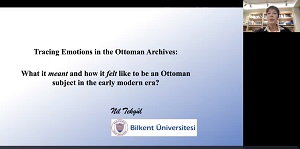The Tobunken Seminar "Workshop Series on Ottoman History I: New Readings of Ottoman Sources" was held online on October 22, 2022, attended by 27 participants from Japan, Turkey, and Germany.
Doctor Nil Tekgül from Bilkent University gave a presentation entitled "Tracing Emotions in the Ottoman Archives: What it meant and how it felt like to be an Ottoman subject in the early modern era?" She first demonstrated the methodology of the history of emotions and then discussed the issues such as emotion codes and emotional communities in early modern Ottoman society based on archival documents.
This workshop was supported by JSPS KAKENHI Grant Number 20H01322.
Date and time: October 22, 2022 (Sat), 4pm–6pm (JST)
Venue: Zoom meeting
Speaker: Nil Tekgül (Bilkent University)
Title: Tracing Emotions in the Ottoman Archives: What it meant and how it felt like to be an Ottoman subject in the early modern era?
Abstract:
The field of “history of emotions” represents fundamentally a new direction in the discipline of history which informs every historical inquiry. It offers a new way to understand the past by exploring the effect and dimension of emotions on behavior, culture, institutions, rituals and others demanding a fresh look at our familiar sources of Ottoman history. This paper starts with a brief discussion on the state-of-the-art of the field of history of emotions worldwide. It then proceeds to emotions in Ottoman history and discusses how to trace emotions in the archival material. It asks the question of what it meant and how it felt to be an Ottoman subject in the early modern era on two grounds which were interdependent and intertwined with one another. On political grounds, it explores emotions of compassion and love and discuss how emotions relate to political concept of protection. On societal grounds, it explores the community-building processes in residential quarters and guilds and argues that a shared concept of gratitude functioned as a tool for drawing boundaries of their communities.

